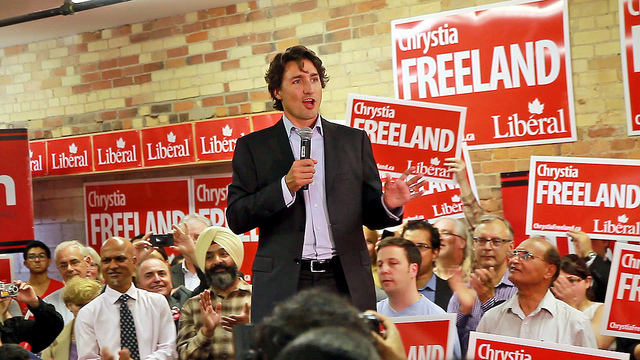In his effort to present himself as the appropriate leader for the post-Harper era, Liberal leader Justin Trudeau seems keen to reframe Canadian political debate in a profound way, depicting hard-hitting, substantive debate as negative, divisive politics.
It was striking that, after the Liberals beat the NDP in two Liberal strongholds in Monday night’s by-elections, Trudeau used the occasion to denounce the NDP as “negative” and “divisive.”
In attacking the NDP like this — in the midst of his own victory speech, no less — Trudeau appeared to be trying to stigmatize forceful debate, suggesting it has no place in political discussion.
Before getting into the broader implications of this, I want to first respond to his charge that the NDP ran a negative personal campaign against Liberal candidate (now MP) Chrystia Freeland in Toronto Centre.
As the NDP candidate who ran against Freeland, I disagree. My campaign was heavily focused on issues, particularly rising inequality and the related housing and jobs crises in downtown Toronto.
I did point to the fact that Freeland had lived outside Canada for the past ten years, raising questions about whether this left her sufficiently familiar with local issues affecting the riding, including the impact of deepening poverty here.
I also noted that, as a senior executive at Thomson Reuters in New York, she had overseen the outsourcing of 25 high-quality, Toronto-based jobs to India, raising questions about her credibility as a defender of middle class jobs.
In my concession speech Monday night — even as Trudeau was denouncing my negativity — I congratulated Freeland on her victory, and praised the exercise in democracy that had taken place in the Toronto Centre byelection.
Beyond Toronto Centre, Trudeau seems to be trying to create a new sort of politics in which anything critical is banned from discussion, and politicians are dismissed as “divisive” if they do more than smile and utter the political equivalent of “have a nice day.”
By contrast, NDP leader Tom Mulcair has shown the importance of vigorous political debate in the tough, principled way he has held Prime Minister Stephen Harper to account over the PMO-Senate scandal in the House of Commons.
Trudeau, apparently less comfortable in this sort of substantive exchange, seems to want less hardball and more beach ball.
Indeed, the Liberal leader, who vigilantly avoids discussion of policy, appears to be carving out a persona for himself that is bland, verging on milquetoast.
Every political leader has a persona, and Trudeau’s slim resumé allows him considerable leeway in constructing one.
On Monday night, he used the occasion of the by-elections to depict himself as leader of the party of “hope” and “positive politics,” borrowing lines from the late NDP leader Jack Layton.
But Layton clearly never meant hope and optimism to be substitutes for tough-minded, rigorous debate. Layton was a master of the cut and thrust of politics. He also cared deeply about the issues, and his hope and optimism was rooted in a commitment to fight hard for the less powerful members of society in the face of overwhelming odds.
To steal Layton’s deathbed words and use them to squelch meaningful political debate is a curious way for Trudeau to try to establish himself as a leader.
Author and journalist Linda McQuaig ran for the NDP in the Toronto Centre byelection. This article was first published in the Toronto Star.
Photo: Joseph.Morris/flickr



